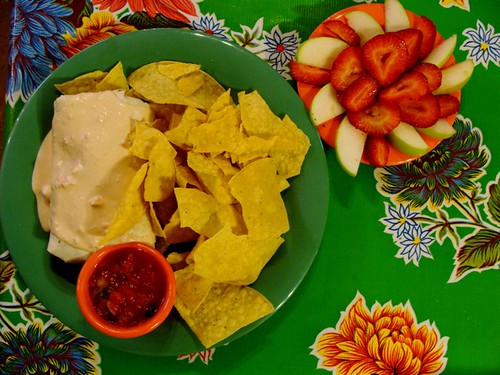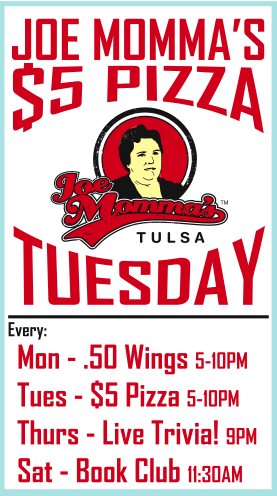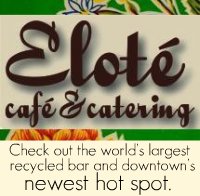Eat Fresh, Shop Local: Why?
The Tulsa-conscious folks behind the tasty vittles at Elote Cafe and Catering at 514 S. Boston have a knack for food, that's for sure.
They're also great at painting a picture. Check it out:
Get the full-sized schematic here.
Or, here's a text version of what's going on up there:
You are going to a baby shower and need to buy a gift. CHOOSE SCENARIO A or B.
SCENARIO A. Chain or online shopping. The result? Your money leaves Oklahoma.
SCENARIO B. Shop at Lundeby's Eco Baby.
The Lundeby's owner Tiffany Bjorlie spends some of the money she makes at her shop dining at Elote.
Libby Auld, chef-owner at Elote, uses the money she makes slinging puffy tacos to patronize local vendors for the food she needs to run her restaurant.
Local vendor Natural Farms uses that money to support local farmers.
The folks at 3 Peas in a Pod uses the money they make with Natural Farms to buy a t-shirt from a local boutique - let's say, at Dwelling Spaces.
Mary Beth Babcock, owner at Dwelling Spaces, does so much business she plum wears out her register counter. She uses money from her t-shirt sales to order a new counter from C2 Design.
Jack Sampson at C2 Design uses some of the money he made whipping up Mary Beth's new counter to gas up at QuikTrip.
Quiktrip is known for it's higher-than-industry-standard salaries - that's one of the reasons it's been judged one of the best places to work in the U.S. several times over.
Well-paid employees do what well-paid employees do - they use their incomes to buy houses. Many choose to procreate.
Guess who's gonna need a baby shower?
Ah, how money makes the world go 'round.
I especially love what's going on in the bottom left corner of this schematic, the Food for Thought section:
8.517 percent (sales tax) of all $ spent locally go to our city and state. If we all made efforts to support local businesses rather than chains and online stores, maybe we could keep our police officers and firefighters.
Yeah. About that.
As long as we here in Tulsa are gonna stick to the sales tax method of funding what needs to get done via City Hall, it's incumbent on us to consider long and hard the consequences of what we perceive to be the convenience and low prices available at mega-marts, online shops and chain restaurants based outside our city. When sales levels in our tax base decrease, so do the sales taxes from which city services, including public safety, are funded.
The resulting question seems to be, are you willing to trade low prices and convenience for shopping locally?
But here's what I've found: In most cases, there's no need to trade.
First we have to talk about what low price really means. Say a local shirt shop carries a t-shirt and posts its price as $20. Then, a mega-chain comes into town. It carries the same shirt and, to attract more customers so the store can sell them an array of other products besides just the shirt, and thanks to the leverage enjoyed by entities able to buy more product than can small shops to obtain lower wholesale prices, the store posts the price of the shirt as $18.
Because of the array of products available at the mega-chain, its level of foot traffic is higher than anything the specialty t-shirt shop has ever seen. Surround sound-style marketing and advertising aimed to convince the consumer all of the prices at the mega-chain are lower than the prices anywhere else (and besides, even when not all of the prices are indeed the lowest, it's easier to do all of one's shopping at just one store rather than going to the trouble to visit several stores hunting for deals, so a lot of folks' logic goes) only increases the allure.
Soon, as customer exposure to the $18 shirt increases and exposure to the $20 shirt decreases, the perception on the market of the cost of that shirt becomes $18.
And we all know what they say about perception.
Now the local guy looks like a racketeer, and the price of the shirt, one of only a couple dozen items the shirt store owner carries, is changed, maybe permanently, to the detriment of his business and, as a result, all of the other local businesses he patronizes.
Plus, the city collects less sales tax on $18 than it does on $20.
Price is a tricky thing, especially when we try to put it on a sliding scale with value. Convenience is weird, too. What I wonder is, how is it less convenient to park, walk into a store, do a little shopping, get great customer service, maybe a little free gift wrapping, and a heartfelt thank-you than to click through page after page of listings of merchandise saturated with advertising, spend an inordinate amount of time making a selection from thousands of choices, enter all of your identification and payment information, click submit and then watch the UPS tracker for five days until your item arrives at your door, seemingly the victim of the opening scene of the first Ace Ventura, Pet Detective movie?
Without ever interacting with another human being.
Subscribe to:
Comments (Atom)







